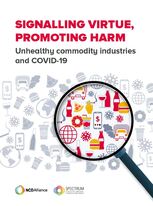New report exposes unhealthy industry responses to COVID-19
The report, ‘Signalling Virtue, Promoting Harm’ released recently provides ample examples of how unhealthy commodity industries, alcohol included, have leveraged COVID-19 for commercial gain.
Examples of activities by several unhealthy commodity industry sectors during COVID-19 have been collected from 90 countries in a crowd-sourcing effort. The data have been analysed and reported by the SPECTRUM research consortium and the NCD Alliance, authored by Jeff Collin, Rob Ralston, Sarah Hill and Lucinda Westerman. The sector that stands out with the most examples of COVID-19 related activities is the alcohol industry (363), closely followed by the ultra-processed food and drink products (328). This means that between them almost 700 examples have been reported in the few months since the COVID-19 pandemic started. In addition, there are examples from tobacco, breast-milk substitutes, fossil fuels and gambling.
Risk worsening the pandemic
The COVID-19 pandemic has represented exceptional challenges to health and society and a multitude of responses from all sectors of society have followed. The report recognises the contribution of many private sector actors, but alongside these it is important to consider the unintended or indirect harms that may arise from the involvement of unhealthy commodity industries.
The authors point out that industries’ strategic responses risk exacerbating the pandemic. “Since the early days of the pandemic, we have observed two trends: the growing epidemiological evidence that people living with Non-Communicable Diseases (NCDs) are suffering worse outcomes from COVID-19, and that many producers of unhealthy commodities have rapidly adapted their strategies in an attempt to capitalise on the pandemic and lockdowns,” said Lucy Westerman, Policy and Campaigns Manager with the NCD Alliance and a co-author of the report . “It is a bitter irony that companies such as tobacco, alcohol and junk food, whose products increase the risk of NCDs, thereby putting people at higher risk of suffering through the pandemic, have positioned themselves as heroes and partners in the response and have interfered in public policies that seek to protect population health.”
Four strategies
The report outlines four broad categories of strategic responses which are common across the sample reported by health advocates, researchers and policy experts from around the world.
The responses by the alcohol industry spans across all four categories. Firstly the industry adapted their advertising and promotions efforts to fit the Covid-19 context. The immediate adaptions included the Accra Brewery donation of brightly patterned re-usable face masks to bar staff in Ghana. In India, where there is a ban on alcohol advertising, Budweiser Streetwear launched branded face-masks as surrogate advertising of its namesake beer.
Many of the responses fall into the second response category, Corporate Social Responsibility (CSR) and philanthropy, that is intended to build support in local communities and enhance brand reputation. In South Africa, a hot spot for discussion about alcohol availability through the different lock down periods, spirits producer Pernod Richard launched the ‘Keep The Spirit’ initiative that offers a supplementary wage of ZAR 500 (about 30 USD) to ”help alleviate the economic impact on members of the bar and restaurant community” for staff that sign-up to training materials about its premium brands.
Partnerships and collaboration are the third category of response, an important and well-known part of industry strategies advancing corporate objectives. These strategies include partnering with governments, like AB InBev donations of hand sanitisers to the Ministry of Health in Mozambique. Other partnerships include those with civil society and non-governmental organisations (NGOs). Brewing giant Heineken announced a donation of €15 million to support the work of the International Federation of Red Cross and Red Crescent Societies (IFRC), particularly in Africa, Asia, and Latin America.
Unhealthy commodity industries have a long history of seeking to shape policy environments in the countries where they operate, and this is the fourth category of strategic response that has been employed in the context of COVID-19. The ban on alcohol sales in some periods in South Africa and Thailand was strongly opposed by the industry, and in Europe the industry group Spirits Europe called on governments to “Recognize the strategic importance of the food supply chain, including the spirits sector, as an essential activity”. In a bid at shaping policy beyond the pandemic, beer producers across Europe have called for reductions in value-added (sales) taxes to support the alcohol industry post-COVID-19.
Conflict of interest
The authors of the report express concerns that in the absence of wider critique and effective responses within health and development communities, the behaviours and activities outlined in the report indicate the prospect of a corporate capture of COVID-19. They also observe how Framework Convention on Tobacco Control rules against industry interference (FCTC Article 5.3) offer an explanation to the comparatively small number and range of tobacco industry actions reported. They go on to suggest “by contrast, the volume and global reach of actions by alcohol and ultra-processed food industries demonstrate the need to advance international efforts to establish principles of engagement and manage conflict of interest.”
The collection of examples is ongoing. More examples of industry actions, activities, communications and behaviours that strike you as interesting, curious and/or concerning may be logged here: bit.ly/NCDA_SPECTRUM_MAPPING_TOOL.

